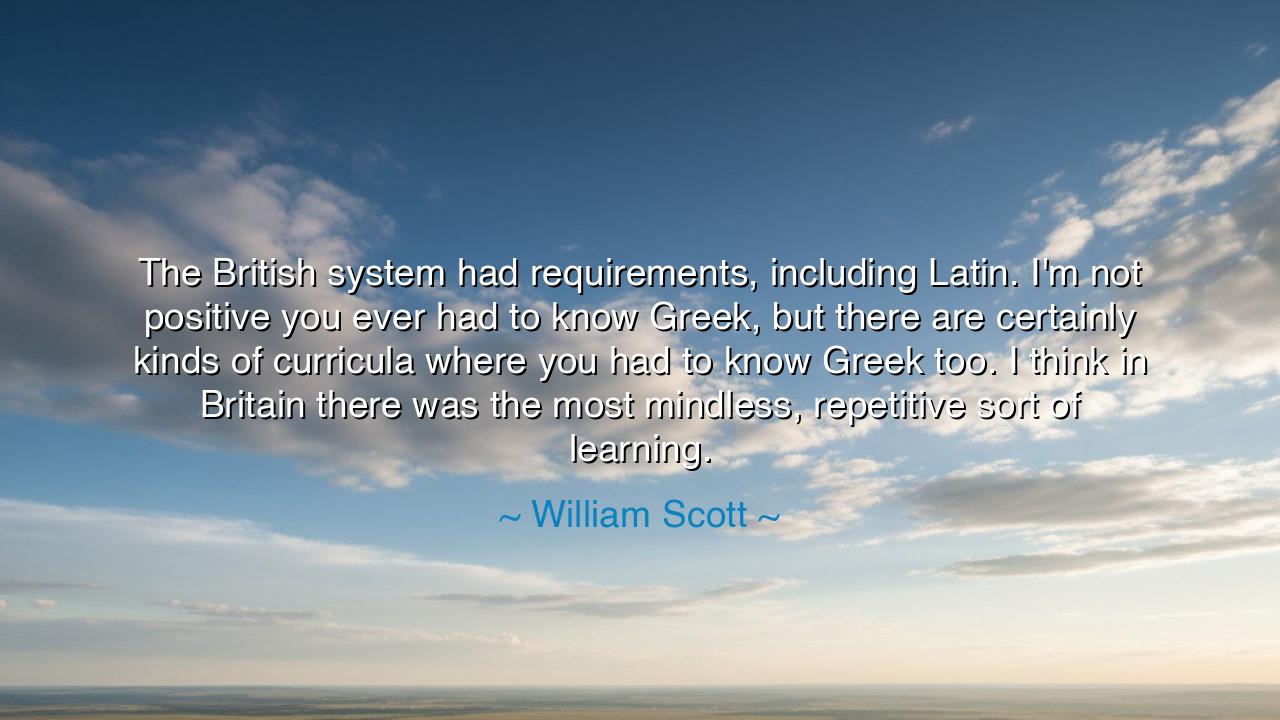
The British system had requirements, including Latin. I'm not
The British system had requirements, including Latin. I'm not positive you ever had to know Greek, but there are certainly kinds of curricula where you had to know Greek too. I think in Britain there was the most mindless, repetitive sort of learning.






Hear the words of William Scott, who reflected upon the weight of tradition in education, saying: “The British system had requirements, including Latin. I'm not positive you ever had to know Greek, but there are certainly kinds of curricula where you had to know Greek too. I think in Britain there was the most mindless, repetitive sort of learning.” These words echo with both respect and lament. Respect, for the ancient languages once deemed essential to culture; lament, for the manner in which they were taught, reduced to empty repetition, divorced from the living fire of wisdom.
He speaks first of requirements, for the British system of education was long rooted in rigid structures. To enter university, one was expected to master Latin, and sometimes Greek, for these were seen as the keys to civilization, the language of scripture, law, and philosophy. Indeed, in centuries past, a man who could not read Cicero or Homer in the original was judged unfit for serious learning. Yet Scott reminds us that what began as noble became mindless, a ritual of memorization rather than true engagement with thought.
Consider the grammar schools of Victorian England. Boys labored endlessly over declensions, conjugations, and passages, translating lines back and forth until the spark of curiosity was buried under monotony. The goal was not to understand the poetry of Virgil or the philosophy of Plato, but to prove discipline and conformity. For some, this training built mental rigor; for many, it crushed imagination. This is the heart of Scott’s critique: that education, when reduced to repetition without meaning, loses its soul.
History reveals this danger in other lands as well. In China, the imperial examination system demanded mastery of the Confucian classics. For centuries, countless students memorized texts word for word, filling their minds with quotations but seldom with inquiry. The system produced order and bureaucrats, but it also suffocated creativity. As with the British curricula, the noble desire to anchor minds in tradition became an exercise in rote learning, more concerned with obedience than with wisdom.
The emotional force of Scott’s words lies in his sorrow that the treasures of antiquity were handled so poorly. To read Greek should have been to walk beside Socrates in the agora, to feel the thunder of Aeschylus, to wrestle with Aristotle. To read Latin should have been to hear Cicero’s eloquence, to march with Caesar, to meditate with Augustine. Yet too often, students were given only the shell, the dry husk of grammar drills, and were denied the living fruit within. Thus the very subjects meant to ennoble became instruments of tedium.
The lesson, O listener, is this: learning must not be reduced to repetition alone. True education is not the memorization of words, but the awakening of the mind. To study the past is not to recite its forms, but to engage with its spirit, to ask questions, to wrestle with ideas, to allow wisdom to live again in the present. Without this, even the noblest curriculum becomes hollow, a cage rather than a lantern.
What then shall you do? First, when you study, do not settle for memorization—seek meaning. Second, when you teach, do not demand only repetition—ignite curiosity. Third, honor the traditions of learning, but do not let them harden into rituals without purpose. Whether in language, science, or art, let education be alive, a dialogue across time, not a monotone chant.
And remember always: as William Scott declared, mindless, repetitive learning drains the life from wisdom. Let us not make the mistake of treating knowledge as a lifeless requirement. Let us, instead, breathe into it spirit and imagination, so that learning becomes not a burden of memory, but a flame of understanding passed from one generation to the next.






AAdministratorAdministrator
Welcome, honored guests. Please leave a comment, we will respond soon